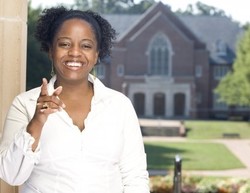In honor of African-American History Month, Racial Ethnic & Women’s Ministries is collaborating with the Rev. Tawnya Denise Anderson, pastor at Unity Presbyterian Church in Temple Hills, Md., to lift up stories of young African-American leaders from across the PC(USA). Over the coming weeks, Anderson’s blog, “SOULa Scriptura,” will run a special series titled “Our New Day Begun” to highlight the stories of African-Americans who are leading the charge in shaping the church’s future.
This post features Elder Zeena Regis, a 34-year-old Ruling Elder and a graduate of Columbia Theological Seminary. She calls Anchorage, Alaska her hometown and she works as a hospice chaplain.
Have you always been in the Presbyterian church?
For most of my childhood and early adulthood, the only real denomination marker I claimed was Protestant. Growing up in a military family on an Air Force base, we attended the chapel services. The services were basically divded into Catholic and Protestant. It was a vibrant and diverse faith community. We had presiding chaplains who were Baptist, Episcopal, Methodist, Pentecostal, Presbyterian and more. I think those formative interdenominational/ ecumenical experiences have always made it difficult for me to claim one denomination.
Tell us about your current role.
I serve at Harbor Grace Hospice as the Inpatient Unit and Pediatric Staff Chaplain. In my work, I provide spiritual and emotional care to terminally ill patients and their families.
What attracted you to hospice chaplaincy? What is most challenging about it?
There is so much that I love about my work. I am honored that people grant me access to their lives in such a sacred time. There is so much that is mysterious, profound, and frightening about death and I’m always surprised and humbled that folks allow me to hold their hand, laugh with them, wipe their tears, read scripture with them, watch Maury Povich with them, and whatever else at this disruptive time.

